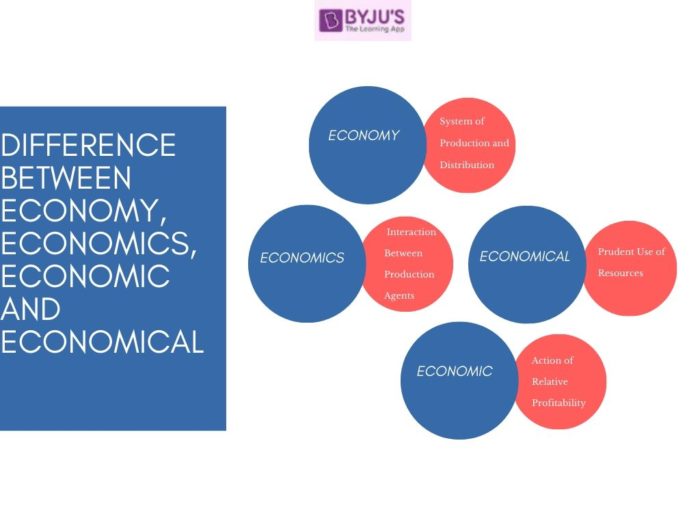The terms, economics, economy, economic and economical are inter-related to each other yet have diverging factors between them.
Economics is a social science that deals with the production, distribution, and consumption of goods and services.
*Economics (Indian Economy) is an optional subject in the UPSC Mains Examination.
The term ‘Economy’ is defined as a social domain that stresses the importance of practices, discourses associated with the production, use, and management of resources.
Economic is used to denote an object or an action that is justified in terms of profitability
Economical on the other hand means giving a reasonable value to time, money and effort spent.
Aspirants preparing for the upcoming Civil Services Exam can test their preparation through the links given below:
| Economic Mains Questions for UPSC GS-3 | UPSC MCQ On Economy – IAS Prelims |
| Economy Questions with Solutions in UPSC Prelims | Previous Year UPSC Question Papers |

The difference between the four terms will be highlighted in this article, which will be useful in the IAS Exam.
How are Economics, Economy, Economic, and Economical different from each other?
The main differences between Economics, Economy, Economic, and Economical are detailed below:
Economics:
- Economics focuses on the actions and interplays of economic agents. In other words, it lays a singular focus on economic factors.
- Economics is further divided into Microeconomics and Macroeconomics. Know the Difference Between Microeconomics and Macroeconomics at the linked article.
- Microeconomics analyzes basic elements in an economy such as individual agents, households, firms, buyers, and sellers.
- Macroeconomics is the study of the economy as a whole where the systems of production, consumption, savings, and investment interact and what this interaction may mean for the economy as a whole.
- Economic analysis has its practical applications in the realm of real estate, business finance, and health care. They even find uses in the environment, social institutions, war, and science.
- Writings about economics, in general, can be found in writings of ancient civilizations such as Greek, Indus Valley Civilization, Roman Empire, etc. But modern economics as we know it lies in the works of Scottish economist Adam Smith (16 June 1723 – 17 July 1790)
Economy
- An economy is an area of the production, consumption, distribution, and trade of goods and services by different economic agents. In the broadest sense, the economy is defined as a social domain that lays stress practices and discourse associated with the production and management of resources.
- In an economy, activity is spurred by production which uses natural resources, labour, and capital. The modes of production evolve along with the technology used.
- The economy is divided into a market-based economy, command based-economy and green economy
- A market-based economy is one where goods and services are produced in accordance with demand and supply between participants by barter or an accepted medium of exchange with a credit or debit value
- A command-based economy is the one where political actions and agents impact the economy. In this economy what must be produced and how it will be sold is decided beforehand by government authorities.
- A green economy is where growth in income and development is driven by public and private investments that reduce carbon emissions and mitigate causes of biodiversity loss
Economic
The word ‘economic’ is used to denote any action or object which is relatively profitable to the party involved. It is also used where there is any form of transaction, monetary, or otherwise is involved. The word first appeared in the late 19th century, initially referring to the practice of household management.
An example of the usage of this term can be as follows:
In terms of economic prowess, India is ahead of a vast majority of the nations of the world.
Candidates can visit the linked article and refer to the Important Economic Terms for UPSC Exam.
Economical
Economical is defined as the wise and prudent use of resources with little or no wastage of resources allocated. It implies precision planning and disposition use of resources to avoid any wastage of resources. The word first appeared in the late 16th century and initially meant managing household management but now its meaning has evolved to being ‘not wasteful’ today
An example of how the term is used is highlighted below:
Tesla cars are more economical than conventional petrol-based cars that usually run on the roads
Aspirants can find more Difference Between Articles, by visiting the linked page
Refer study materials for UPSC Economics (Indian Economy) optional subject through the links given below:
- Economics and Indian Economy Notes for UPSC
- Economy This Week
- Strategy and Syllabus for UPSC Economics
- Topic-wise IAS Prelims Questions with Solutions [2013-2020]
- Difference Between Economics and Sociology
Difference Between Economics, Economy, Economic and Economical – Download PDF Here
Frequently Asked Questions about Economics, Economy and Economic
What is the meaning of economy and economics?
What is economics?
Candidates can find the general pattern of the UPSC Exams by visiting the UPSC Syllabus page. For more articles and exam-related preparation materials, refer to the links given in the table below:
Related Links

Comments